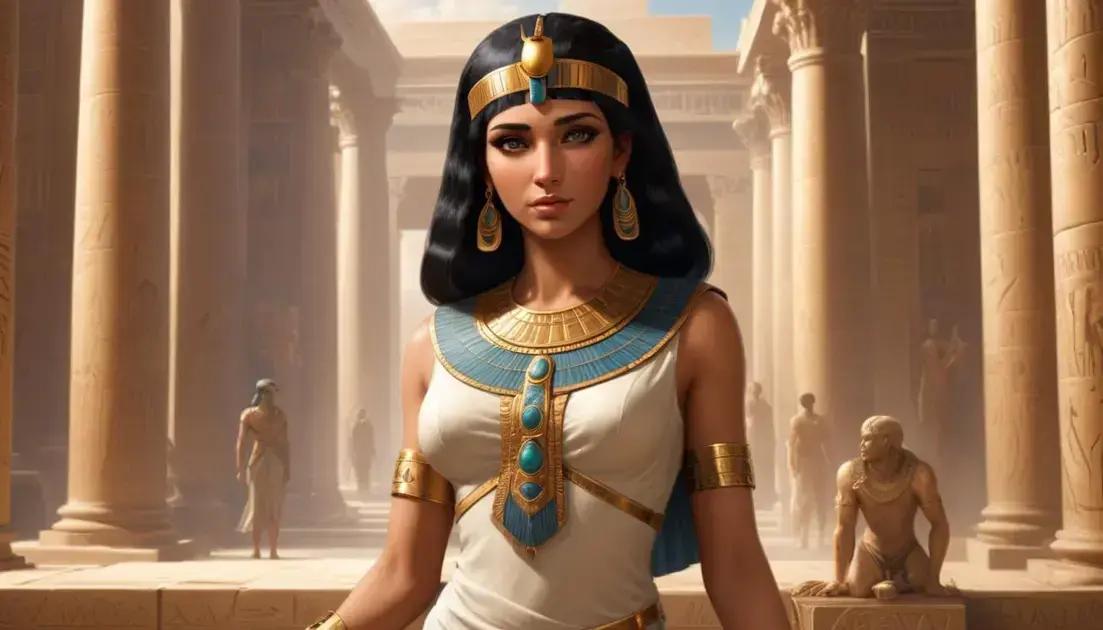
Cleopatra: Power, Politics and Egypt’s Last Pharaoh
Cleopatra’s reign significantly impacted ancient Egypt and the world through her cultural contributions. She expertly blended Egyptian and Greek traditions, influencing art, literature, and education. Cleopatra’s relationship with prominent Roman leaders like Julius Caesar and Mark Antony shaped her political landscape and strengthened her power. Additionally, her distinctive style set trends that affected beauty standards across the Mediterranean. Overall, Cleopatra remains a symbol of strength and resilience, leaving a lasting legacy that fascinates people to this day.
Cleopatra was not just a queen; she was a master strategist whose story still captivates us today. Want to know how she managed to balance power and charisma? Read on!
The Life and Legacy of Cleopatra
Cleopatra’s life was a fascinating mix of power and intrigue. She ruled Egypt during a time of great change. Born in 69 BC, she was highly educated and fluent in several languages. Cleopatra became famous for her intelligence and wit, which helped her secure her place as one of the most powerful women of her time.
Early Life
Cleopatra came from a royal family. Her father was the Pharaoh Ptolemy XII. When he died, Cleopatra became co-ruler with her younger brother. Surprisingly, Egypt’s ruling family spoke Greek, even though they ruled over Egyptian people. Cleopatra was determined to learn and embrace her Egyptian heritage.
Becoming Pharaoh
When she became Pharaoh, Cleopatra faced challenges. Her brother, Ptolemy XIII, tried to take over. Cleopatra sought help from Julius Caesar, the leader of Rome. Their relationship changed the course of her reign. With Caesar’s support, she regained control of Egypt.
Relationship with Rome
Cleopatra’s ties to Rome were crucial. After Julius Caesar’s assassination, she aligned with Mark Antony. Their partnership shocked many. Together, they aimed to expand their influence, but they faced stiff opposition. Ultimately, their defeat led to Cleopatra’s tragic end.
Legacy
Today, Cleopatra’s legacy continues to fascinate people. She is remembered not just as a ruler but as a symbol of beauty, intelligence, and resilience. Many books, movies, and plays have explored her story. She remains a powerful figure in history, representing the complex nature of leadership and ambition.
Political Maneuverings in Ancient Egypt
Political maneuverings in ancient Egypt often shaped the course of history. Leaders used strategy to maintain power and influence. Cleopatra was a master at these tactics. She understood the significance of alliances and relationships.
Understanding Power Dynamics
In ancient Egypt, power was everything. Rulers had to balance tradition with new ideas. They faced threats from rivals, both inside and outside Egypt. This meant careful planning and decision-making were crucial.
Alliances and Betrayals
Cleopatra formed key alliances to secure her position. Her relationship with Julius Caesar was one example. This alliance strengthened her power against rival factions. However, such partnerships could also lead to betrayals. Trust was a precious and fragile element in politics.
Military Strategies
Military strategies played a big role in Egypt’s politics. Leaders often turned to war to assert dominance. Cleopatra even led troops into battle. She bravely fought for her kingdom, showing her commitment and strength.
Impact of Roman Influence
The encroaching influence of Rome changed everything. Cleopatra’s alliances with Roman leaders were strategic. They provided aid and legitimacy. Yet, they also brought new challenges as Egyptian sovereignty came under threat.
These political maneuverings remain a fascinating topic. They reveal how leaders navigated a complex world of power, loyalty, and conflict, shaping Egypt’s fate for centuries.
Cleopatra’s Relationships with Rome
Cleopatra’s relationships with Rome were crucial to her reign. She cleverly navigated the complex politics of her time. By connecting with powerful Roman leaders, she sought to strengthen Egypt.
The Alliance with Julius Caesar
Julius Caesar was a key figure in Cleopatra’s rise to power. Their relationship began when Caesar visited Egypt. Cleopatra saw in him an opportunity for support against her brother. Their alliance helped her regain control of the throne.
Impact of Their Relationship
Cleo and Caesar’s bond was more than political. It was personal too. They had a son named Caesarion, who became a symbol of their union. This relationship transformed Cleopatra’s position and made her a prominent player in Roman politics.
Mark Antony’s Influence
After Caesar’s death, Cleopatra aligned with Mark Antony, another powerful Roman leader. Together, they conducted military campaigns against shared enemies. Their relationship sparked both admiration and criticism.
Challenges and Downfall
Despite their strengths, this alliance carried risks. Many Romans viewed Cleopatra as a foreign threat. The civil war in Rome put her and Antony on the defensive. Their eventual defeat led to dire consequences for both.
Cleopatra’s relationships with Rome illustrate her political skill and ambition. She used these connections to forge her legacy, but they also contributed to her downfall.
Cultural Impact of Cleopatra’s Reign
Cleopatra’s reign had a huge cultural impact, not just on Egypt but on the world. She blended Egyptian and Greek cultures, creating a unique identity. This mix still fascinates people today.
Art and Literature
During Cleopatra’s time, art flourished. Artists were inspired by her beauty and intelligence. Many works depicted her as a powerful figure. Literature also thrived, with stories about her life spreading far and wide.
Religion and Spirituality
Religion was important in Cleopatra’s reign. She was seen as a goddess, especially Isis, the Egyptian goddess of magic and motherhood. This connection boosted her popularity and influence. People looked to her for both political and spiritual guidance.
Language and Education
Cleopatra was well-educated and spoke several languages. She promoted learning and encouraged scholars to study in Alexandria. The Library of Alexandria became one of the greatest centers of knowledge in the ancient world.
Fashion and Beauty Standards
Her style set trends that influenced beauty standards. Cleopatra was known for her striking makeup and luxurious clothing. Women across the Mediterranean region tried to imitate her looks, showing her lasting influence on fashion.
Cleopatra’s reign left a rich cultural legacy. Her impact on art, literature, and fashion still resonates today, making her a timeless figure in history.
Conclusion
In conclusion, Cleopatra’s reign was a remarkable period in history. Her ability to blend cultures and influence art, education, and fashion has left a lasting legacy. Cleopatra was not just a ruler; she was a symbol of power and beauty.
Her relationships with powerful Roman leaders shaped her country’s future and her own path. While her story ended in tragedy, her impact on culture and society continues to inspire us today. We still learn from her life, reflecting on the lessons of leadership, strength, and resilience.


